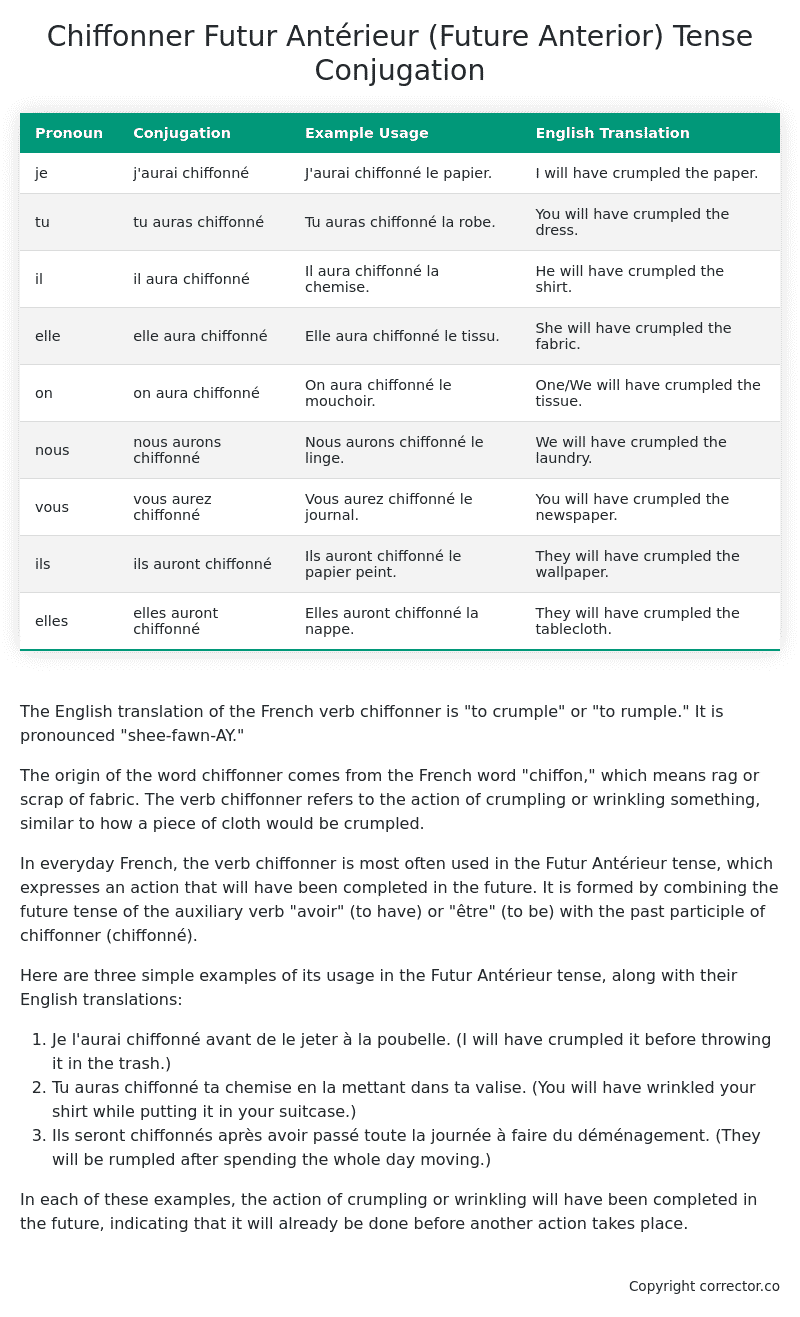Futur Antérieur (Future Anterior) Tense Conjugation of the French Verb chiffonner
Introduction to the verb chiffonner
The English translation of the French verb chiffonner is “to crumple” or “to rumple.” It is pronounced “shee-fawn-AY.”
The origin of the word chiffonner comes from the French word “chiffon,” which means rag or scrap of fabric. The verb chiffonner refers to the action of crumpling or wrinkling something, similar to how a piece of cloth would be crumpled.
In everyday French, the verb chiffonner is most often used in the Futur Antérieur tense, which expresses an action that will have been completed in the future. It is formed by combining the future tense of the auxiliary verb “avoir” (to have) or “être” (to be) with the past participle of chiffonner (chiffonné).
Here are three simple examples of its usage in the Futur Antérieur tense, along with their English translations:
- Je l’aurai chiffonné avant de le jeter à la poubelle. (I will have crumpled it before throwing it in the trash.)
- Tu auras chiffonné ta chemise en la mettant dans ta valise. (You will have wrinkled your shirt while putting it in your suitcase.)
- Ils seront chiffonnés après avoir passé toute la journée à faire du déménagement. (They will be rumpled after spending the whole day moving.)
In each of these examples, the action of crumpling or wrinkling will have been completed in the future, indicating that it will already be done before another action takes place.
Table of the Futur Antérieur (Future Anterior) Tense Conjugation of chiffonner
| Pronoun | Conjugation | Example Usage | English Translation |
|---|---|---|---|
| je | j’aurai chiffonné | J’aurai chiffonné le papier. | I will have crumpled the paper. |
| tu | tu auras chiffonné | Tu auras chiffonné la robe. | You will have crumpled the dress. |
| il | il aura chiffonné | Il aura chiffonné la chemise. | He will have crumpled the shirt. |
| elle | elle aura chiffonné | Elle aura chiffonné le tissu. | She will have crumpled the fabric. |
| on | on aura chiffonné | On aura chiffonné le mouchoir. | One/We will have crumpled the tissue. |
| nous | nous aurons chiffonné | Nous aurons chiffonné le linge. | We will have crumpled the laundry. |
| vous | vous aurez chiffonné | Vous aurez chiffonné le journal. | You will have crumpled the newspaper. |
| ils | ils auront chiffonné | Ils auront chiffonné le papier peint. | They will have crumpled the wallpaper. |
| elles | elles auront chiffonné | Elles auront chiffonné la nappe. | They will have crumpled the tablecloth. |
Other Conjugations for Chiffonner.
Le Present (Present Tense) Conjugation of the French Verb chiffonner
Imparfait (Imperfect) Tense Conjugation of the French Verb chiffonner
Passé Simple (Simple Past) Tense Conjugation of the French Verb chiffonner
Passé Composé (Present Perfect) Tense Conjugation of the French Verb chiffonner
Futur Simple (Simple Future) Tense Conjugation of the French Verb chiffonner
Futur Proche (Near Future) Tense Conjugation of the French Verb chiffonner
Plus-que-parfait (Pluperfect) Tense Conjugation of the French Verb chiffonner
Passé Antérieur (Past Anterior) Tense Conjugation of the French Verb chiffonner
Futur Antérieur (Future Anterior) Tense Conjugation of the French Verb chiffonner (this article)
Subjonctif Présent (Subjunctive Present) Tense Conjugation of the French Verb chiffonner
Subjonctif Passé (Subjunctive Past) Tense Conjugation of the French Verb chiffonner
Subjonctif Imparfait (Subjunctive Imperfect) Tense Conjugation of the French Verb chiffonner
Subjonctif Plus-que-parfait (Subjunctive Pluperfect) Tense Conjugation of the French Verb chiffonner
Conditionnel Présent (Conditional Present) Tense Conjugation of the French Verb chiffonner
Conditionnel Passé (Conditional Past) Tense Conjugation of the French Verb chiffonner
L’impératif Présent (Imperative Present) Tense Conjugation of the French Verb chiffonner
L’infinitif Présent (Infinitive Present) Tense Conjugation of the French Verb chiffonner
Struggling with French verbs or the language in general? Why not use our free French Grammar Checker – no registration required!
Get a FREE Download Study Sheet of this Conjugation 🔥
Simply right click the image below, click “save image” and get your free reference for the chiffonner Futur Antérieur tense conjugation!

Chiffonner – About the French Futur Antérieur (Future Anterior) Tense
Construction
Common Everyday Usage Patterns
Interactions with Other Tenses
For example
Summary
I hope you enjoyed this article on the verb chiffonner. Still in a learning mood? Check out another TOTALLY random French verb conjugation!


